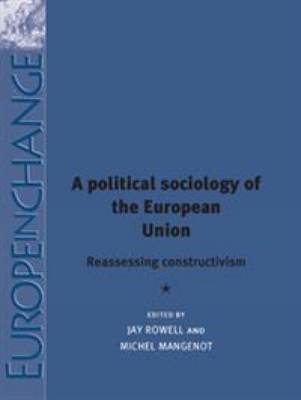A political sociology of the European Union - Reassessing constructivism
Michel MANGENOT, Jay ROWELL
Availability:
- Categories: Civil Service, Governance & Politics
- Publisher: MANCHESTER UNIVERSITY PRESS
- Collection: Europe in Change
- ISBN: 9780719082436
- Publication Date: 01/09/2010
- Binding: Hardback
- Number of pages: 272
Summary
The study of the European Union has historically been a theoretical battleground. Since the 1990’s, new theoretical directions such as neo-institutionalism, multi-level governance and constructivism have provided a new impetus. However, these innovations have often remained programmatic and despite these new inroads, empirical work has often remained sociologically and empirically underspecified.
This volume seeks to bridge the gap between theory and fieldwork by developing an actor-centred political sociology. In doing so, the volume engages in a critical dialogue with the constructivist framework and proposes to build on its insights through a sociological hardening centred on European actors.
The renewal of European studies through political sociology is only useful if it generates new understandings through empirical observation. This volume seeks to take a new tack on constructivism by asking what it is that Europe constructs. To answer this question, the book addresses three areas of construction. Firstly, social spaces and professions where the autonomy of a European institutional field, socialisation processes and interactions will be examined by studying top civil servants of the Commission, the Council secretariat, legal professions and regional specialists of Europe. Secondly, the construction of policy “problems” and policies through interplay of interest groups, judicial actors, national representatives, and actors of the European institutions. Finally, specific policy instruments such as the Eurobarometer, benchmarks, and statistical indicators.
Edited by the directors of the Centre for European Political Sociology at the University of Strasbourg, the book brings together thirteen specialists in political sociology interested in institutionalisation processes and the role of social actors in the emergence of a European polity.
Table of contents
Preface- Revitalising EU studies through constructivism- Andy Smith
Introduction- What Europe constructs: Towards a sociological constructivism- Michel Mangenot, Jay Rowell
PART I: The construction of European fields
1. Making top civil servants: Europeaness as an identity and a resource- Marine de Lassalle, Didier Georgakakis
2. The invention and transformation of a governmental body: the Council Secretariat-Michel Mangenot
3. Lawyers as Europe’s middlemen. A sociology of litigants pleading before the European Court of Justice (1954-1978)- Christele Marchand, Antoine Vauchez
4. The emergence of ‘European’ careers in sub-national French administrations- Marine de Lassalle
PART II: The social construction of European problems
5. Constitutional activism and fundamental rights in Europe: common interests through transnational socialisation- Laurent Scheeck
6. The construction of a European interest through legal expertise. Property owners associations and the Charter of Fundamental Rights- Hélène Michel
7. A constructivist-institutionalist approach to EU Politics: The case of Protected Geographical Indications for Food- Andy Smith
8. The European Parliament and the politicisation of the European space – the case of the two port packages- Willy Beauvallet
PART III: Constructing reality through policy instruments
9. From integration by law to Europeanisation by numbers. The making of a ‘competitive Europe’ through intergovernmental benchmarking- Isabelle Bruno
10. From an instrument to the instrumentalisation of ‘European opinion’- Philippe Aldrin
11. Expert measurement in the government of Lifelong Learning- Romuald Normand
12. The instrumentation of European disability policy: constructing a policy field with numbers- Jay Rowell
